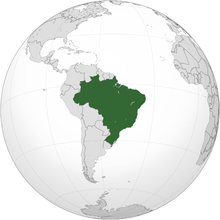Nation/2nd Empire of Brazil
| This page is a work in progress by its author(s) and should not be considered final. |
| Empire of Brazil Império do Brasil
|
|||||
|---|---|---|---|---|---|
|
|||||
| Motto: "Independence or Death" | |||||
| Anthem: "Triunfal March" | |||||
Empire of Brazil at its largest territorial extent since 1902
|
|||||
| Region | Brasil | ||||
| Capital | Rio de Janeiro | ||||
| Largest city | São Paulo | ||||
| Official languages | Portuguese | ||||
| Demonym | Brazilian | ||||
| Government | Constitutional Monarchy | ||||
| - | Emperor | Dom Luiz I | |||
| - | Prime Minister | Francisco de Assis, Duke of Petropolis | |||
| Legislature | General Assembly | ||||
| - | Upper house | Senate | |||
| - | Lower house | Chamber od Deputies | |||
| Independence from United Kingdom of Portugal, Brazil and Algarve | |||||
| - | Declared | 7 September 1922 | |||
| - | Recognized | 29 August 1825 | |||
| - | Adoption of Empire's constitution | 25 March 1824 | |||
| - | Monarchy abolished | 15 November 1889 | |||
| - | Monarchy restored | 16 May 1893 | |||
| Area | |||||
| - | Total | 8,515,767 km2 3,287,597 sq mi |
|||
| - | Water (%) | 0,65% | |||
| Population | |||||
| - | 2015 estimate | 204,768,562 | |||
| - | Density | 23.8/km2 61.6/sq mi |
|||
| GDP (PPP) | 2015 estimate | ||||
| - | Total | NS$ 10 trillion | |||
| - | Per capita | NS$ 21,021.00 | |||
| GDP (nominal) | 2015 estimate | ||||
| - | Total | NS$ 8,5 trillion | |||
| - | Per capita | NS$ 23,780.07 | |||
| Gini (2015) | 0.44 low |
||||
| HDI (2015) | 0.911 very high |
||||
| Currency | Réis (RS) |
||||
| Time zone | UTC (UTC-2 to -5) | ||||
| Date format | dd/mm/yyyy | ||||
| Drives on the | right | ||||
| Calling code | +55 | ||||
| ISO 3166 code | BR | ||||
| Internet TLD | .br | ||||
| a. | The German, Italian and Nhegatu are spoken respectively by some people in south and north Brazil. | ||||
Brazil, officially the Empire of Brazil is the largest country in both South America and the Latin American region. It is the world's fifth largest country, both by geographical area and by population. It is the largest Portuguese-speaking country in the world, and the only one in the Americas.
Bounded by the Atlantic Ocean on the east, Brazil has a coastline of 7491 km². It borders all other South American countries except Ecuador and Chile and occupies 47.3 percent of the continent of South America. Its Amazon River basin includes a vast tropical forest, home to diverse wildlife, a variety of ecological systems, and extensive natural resources spanning numerous protected habitats. This unique environmental heritage makes Brazil one of 17 megadiverse countries, and is the subject of significant global interest and debate regarding deforestation and environmental protection.
Brazil was inhabited by numerous tribal nations prior to the landing of traveler Pedro Álvares Cabral in 1500, who claimed the area for Portugal. Brazil remained a Portuguese colony until 1808, when the capital of the empire was transferred from Lisbon to Rio de Janeiro after French forces invaded Portugal. In 1815, it was elevated to the rank of kingdom upon the formation of the United Kingdom of Portugal, Brazil and the Algarves. Its independence was achieved in 1822 with the creation of the Empire of Brazil, a unitary state governed under a constitutional monarchy and a parliamentary system. The country became a presidential republic in 1889, when a military coup d'état proclaimed the Republic. Later, in 16 May 1893, the republic falls and the monarchy was restored, with some changes in the governance. The Federation is composed of the union of the Neutral Municipality, the 20 provinces, and the 3,500 municipalities.
The country's economy is the world's third largest by nominal and GDP. A member of the G8 group, Brazil had one of the world's fastest growing major economies, with its economic reforms giving the country a powerhouse international recognition and influence. Brazil's national development bank plays an important role for the country's economic growth. Brazil is a founding member of the United Nations, the G20, G8, Unasul, Mercosul, Organization of American States, Organization of Ibero-American States, CPLP and the Latin Union. Brazil is a super power in all international affairs, with some analysts identifying it as an Hyper Power. Brazil has been the world's largest producer of coffee for the last 150 years.



